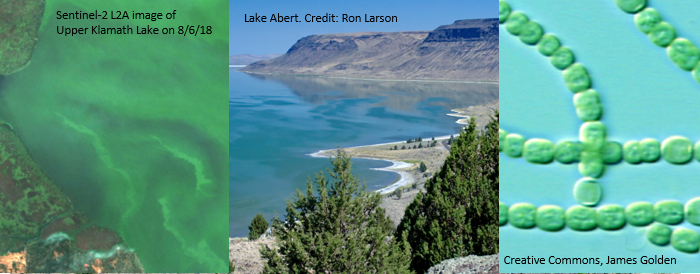
2021 Oregon Lakes Association Online Seminar Series
Wednesday Nov 3 (2:30-5pm), Nov 10 (2:30-5pm) and Dec 1 (3-5pm)
Online Zoom meetings
The Oregon Lakes Association will be holding our Annual Lakes Conference as a series of online, Wednesday afternoon sessions this fall. Session topics are:
- CyanoHAB monitoring and detection. Wednesday, November 3rd from 2:30-5 pm
- Lake physiology and management and OLA Business Meeting. Wednesday, November 10th from 2:30-5 pm
- Our beautiful lakes: past and present. Wednesday, December 1st from 3-5 pm
Presentations will cover a wide range of topics including desert lakes, climate change, paleolimnology, remote sensing of cyanobacterial blooms, water quality modeling, and lake management. The Conference Agenda and Abstracts are available at this link.
The meeting will be a remote video conference offered through Oregon State University’s Zoom platform. Registration is free for Oregon Lakes Association members and $20 for non-members - or join OLA! Individual annual memberships cost $35. After registration, you will receive an email with instructions on how to join the Zoom meeting including a URL link, phone number, and a password. To participate you can join by computer (video or audio) or telephone. You do not need to load Zoom onto your computer; you can connect with Polycom, Cisco, or other room system if you don’t want to use the Zoom access link.
This meeting is open to anyone interested in Oregon lakes so feel free to alert colleagues or friends who may not have seen an invitation.
Wednesday, November 3, 2:30-5:00 pm
CyanoHAB monitoring and detection, chaired by Dan Sobota
- Modeling Cyanotoxin Production, Fate and Transport in Surface Waterbodies. Bernadel Garstecki, Portland State University
- Use of peroxyacetic acid (PAA)/hydrogen peroxide in freshwater cyanobacterial control – case study of lab scale trials and treatments in relation to use in field sites. Tom Warmuth, BioSafe Systems
- Proof of concept: use of volatile organic compounds to predict toxic HAB trajectories and species composition in Upper Klamath watershed, OR. Lindsay Collart, Oregon State University, (2020 OLA Scholarship recipient)
- Detecting Algal Blooms in Small Reservoirs of Northern California using Sentinel-2 Imagery in Google Earth Engine. Chippie Kislik, UC Berkeley
- Three years of comparing satellite imagery with field data on cyanobacteria blooms in lakes and reservoirs of the Upper Deschutes River Basin. Daniel J. Sobota, Oregon Department of Environmental Quality
- Utilizing CyAN for improved detection of harmful algal blooms. Alyssa Payne and Kelly Fry (student). Clark County Public Health
- Satellites predict lakes at risk from cyanobacteria and microcystin toxins. Amalia Handler. USEPA
Wednesday, November 10, 2:30-5:00 pm
2:30-3:00 OLA Annual business meeting
3:00-5:00 Lake physiology and management, chaired by Desiree Tullos
- Toxic Dolichospermum cyanobacteria in Oregon lakes. Theo Dreher. Oregon State University
- Natural and anthropogenic controls on lake water-level decline and evaporation-to-inflow ratio in the conterminous US. Emi Fergus. USEPA
- Evaluation of mixing mechanisms in the control of cyanobacterial blooms. Desiree Tullos. Oregon State University
- Water Quality Modeling in Lakes and Reservoirs. How Good Should Your Model Be? Scott Wells. Portland State University
- Online Boater Led Check-In/Check-Out Alternative to In-Person Inspections. A COVID-19 Response Pilot. Edgar Rudberg. CD3, General Benefit Corporation.
Wednesday, December 1, 3:00-5:00 pm
Our beautiful lakes: past and present, chaired by Ron Larson
- A multiproxy approach to reconstruct paleotemperature, vegetation change, fire history, and lake productivity in the Pacific Northwest, Gold Lake, Willamette National Forest, OR. Jamila Baig (2021 OLA Scholarship recipient). Oregon State University
- A progression of understanding of the turbid, shallow Malheur Lake: Restoration implications. Casie Smith. USGS
- Effects of climate change on Lake Abert: Initial results based primarily on ground-acquired data. Ron Larson. Oregon Lake Association
- Effects of climate change on Great Basin playa lakes in Oregon: Initial results using mostly satellite data. Dorothy Hall. Earth System Science Interdisciplinary Center/University of Maryland and Cryospheric Sciences Laboratory, NASA/Goddard Space Flight Center
- We just bought a lake. Now what? Judy Sims
ENQUIRIES TO: Dr. Theo Dreher, Department of Microbiology, OSU. theo.dreher@oregonstate.edu